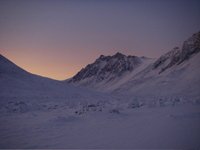Bill Jirsa: "Antarctica Trumped my Funk"
It's hard to describe Ice People--but if I had one word it would be eclectic. I was fascinated, intrigued and often in awe of those I met, so in these pages I will introduce you to some, and have them describe their experiences this season. So: meet Bill Jirsa, computer wizard, master of languages, and a beautiful writer. I recently asked him what he was up to on the ice and this is his amazing response. You can find more of his writing at icetongue (the world’s southernmost literary journal) or on his website elementarypenguin.
Bill writes: I was stranded at Lake Hoare last week. The weather changed while I was there to install the computer systems. I had about one day of work, and I ended up there for six nights as the weather remained just dodgy enough to cancel helo flights. I had to stay close to the radio through the day in case the weather opened up, but each day by about 3 or 4 pm they would cancel the day outright and tell the pilots to get some sleep. That’s when I set out for a night of wandering the Taylor Valley. This is my fourth season working in Antarctica. My job seldom takes me far from the station, and I’ve resisted returning to work here this year—thinking I should grow up and get a job where I don’t live in a dorm, start cooking for myself again. Mostly I’ve started to feel a bit sad that Antarctica has begun to feel ordinary to me.
There’s about a half hour from 10:30 to 11:00p each night this time
of year when the sun wheels around to the south and aligns with the
slot between the peaks over the Taylor Glacier and if it happens to
clear up, the evening light spills in like butterscotch (as Joni
Mitchell would say), and the face of the glaciers light up like
multifaceted glass. I was partway up a ridge in a particular location
that should remain undisclosed. I felt the cold starting to seep in as
soon as I stopped to watch the light, frost on my eyelashes, flapping
my arms to keep warm—but comfortably within my personal system for
staying warm in this climate. The ridge across the valley lit up as the
golden light began to crawl across the valley floor. I poured myself a
cup of green tea from my thermos (I take it a little too strong and a
little too sweet to keep me going on long hikes).
The sound of me sipping was remarkable—I noted suddenly how deafeningly
quiet and calm it had become, and I realized that the only sound I’d
heard for the last seven hours was my own breathing, my own feet
crunching on the fresh snow. I had become mesmerized by the cavalcade
of my own thoughts as I’d hiked, and I realized that for the first time
in four seasons on this continent, I was utterly alone in Antarctica.
There were only two other people at all in this entire valley and they
were miles away and I knew they’d be fast asleep by now. (My radio was
off inside my pocket.) The light rolled around and climbed the ridge
where I stood, and the effect of the radiation was immediate—I shed my
parka and watched the sweat steaming off my fleece, felt the back of my
hands warming when I held them to the light, and I had to admit that
this place had trumped my funk: alright, I conceded aloud, this was an
extraordinary moment.
In a few more moments, the sun slipped behind the peaks, and the valley
returned to hard blue shadow, biting cold air in my nostrils. I packed
up and started walking again— The weather had cleared. I had a
scheduled helo pickup in about 9 hours and that was at least six or
seven hours on foot from where I stood. If I hustled, I might get a
quick nap before I had to get back to McMurdo.
